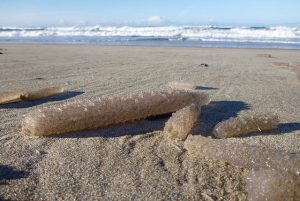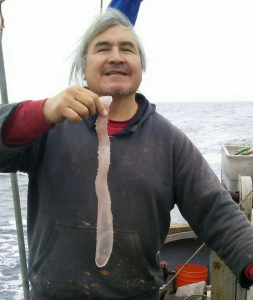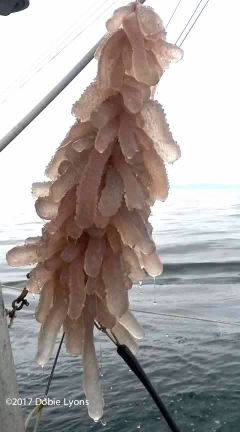
Pyrosomes, minustide/Flickr, CC2.0
The summer of 2017 has seen the development of unprecedented swarms of pyrosomes in the north-east Pacific. What is most unusual is that pyrosomes are typically found in tropical and sub-tropical oceans.
Pyrosomes are free drifting tunicates, microscopic gelatinous zooplankton that form colonies from a few centimetres in size to well over a metre. Pyrosomes are not toxic, or predators, but are grazers of microscopic algae, phytoplankton. Their colonies are long, tubular, and quite firm to the touch, which is why some refer to them as “sea pickles.” Pyrosome translates to “fire body,” in reference to their powerful bioluminescence, which can be seen at night when they are disturbed.
Since the Spring, massive numbers have been observed from Oregon to SE Alaska. In British Columbia, Moira Galbraith, a zooplankton biologist with the Department of Fisheries and Oceans, reports that they have been observed from the west coast of Vancouver Island to hundreds of miles offshore. In Oregon, Dr. Rick Brodeur of the Northwest Fisheries Science Center reported a haul of 60,000 pyrosomes from a 5-minute net trawl.

Pyrosome, Photo ©: Dobie Lyons
Although it is not clear what has caused the introduction of these animals into BC waters, it is possible that the marine heat wave experienced in the 2014 and 2015, and subs-sequent El Nino in the 2016 winter, may have been contributing factors. Not only did these events warm the ocean, but they also transported warm, southern waters of the California Current into British Columbia.
What impact might these animals have on our BC ecosystems? As grazers, pyrosomes are expected to compete with crustacean zooplankton, including copepods and krill, for their phytoplankton food. This is potentially disruptive to the typical BC food webs, directing resources away from the copepods and krill that sustain fish species such as herring and salmon. Because of their gelatinous bodies, pyrosomes have low nutritional value, and although there are reports from the Central Coast of halibut consuming large quantities of these organisms, it is unlikely that they are able to support themselves on a pyrosome diet.

Pyrosomes on trawler gear, Photo ©: Dobie Lyons
Pyrosomes may also present challenges to local fisherman by clogging the gears used to catch their fish.
The Department of Fisheries and Oceans and the Hakai Institute’s ongoing ocean observing programs will be keeping a close eye on how this pyrsosome bloom persists and its implications for the BC Pacific marine ecosystem.

Dr. Brian Hunt
by Dr. Brian Hunt
Assistant Professor, Institute for the Oceans and Fisheries
UBC Hakai Professor in Oceanography
Related stories
- Jellied sea creatures confound scientists, fishermen on U.S. Pacific Coast, Reuters, June 27, 2017
- Millions of tropical sea creatures invade waters off B.C. coast, CBC News, June 18, 2017
- Bizarre, Glowing Sea Creatures Bloom in the Pacific, National Geographic, June 13, 2017
Tags: Brian Hunt, British Columbia, faculty, plankton, pyrosomes